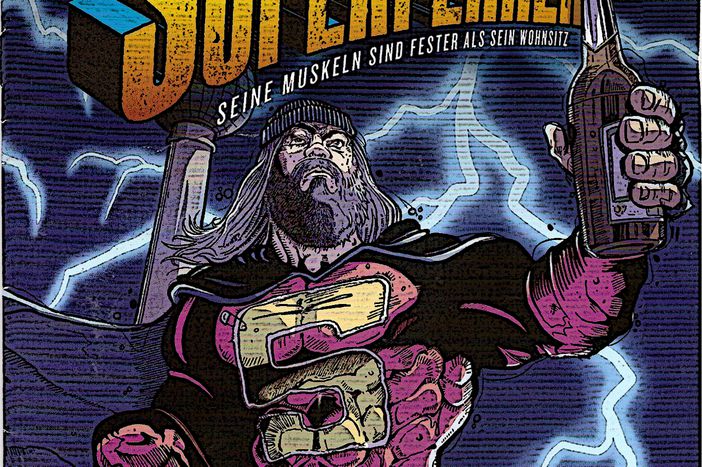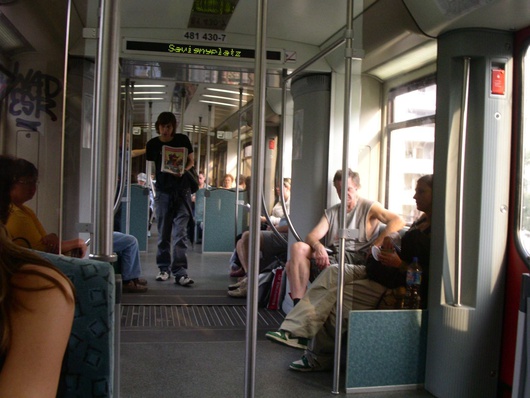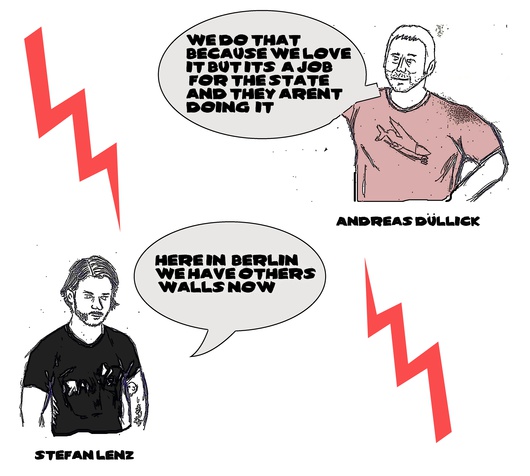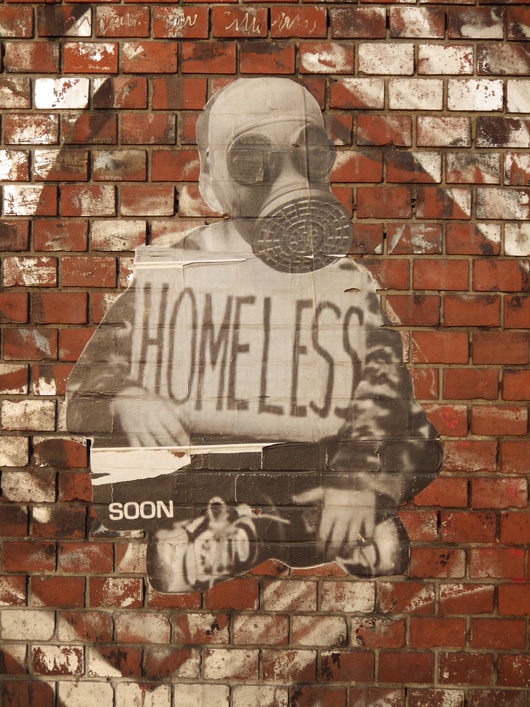
The Superheroes of Berlin: On the Other Side of the Wall
Published on
Translation by:
Emanuel Nevárez PagánBerlin is one of the busiest cities in Europe. Punks, cosmopolitans, tourists, and even beggars, all kinds of young people spend their days on the streets of this city; they are, however, shunned by society. But a superhero has arrived, will he be able to challenge the established social norms and defeat those who stand in his way?
Thirty minutes after arriving at Nükolln train station in Berlin, I ran into him. He was a young man in his twenties begging for a few coins, both in German and English. He stood there for the next two hours, while I paced in and out of the station. That's when I knew, my journey to find the social outcasts of this iconic city seemed promising.
Actually, the real story begins after learning about a comic book called SuperPenner (which translated means, Super-Vagabond), created by Stefan Lenz. According to unofficial sources, between 4,000 and 12,000 people live on the streets of Berlin: rockers, hipsters, and the homeless, to whom begging on the streets is a form of protest against a society with which they no longer agree. Youngsters, punks, runaways...apparently these are the real problems. Those, who didn't have any other option left in life. Those, whom everyone looks at with disdain from the other side of the sidewalk.
 After unpacking my bags at the hotel, I met Andreas Düllick, Editor-in-chief of the independent newspaper Strassenfeger, a small organisation, and a safe haven for the homeless. At the eastern end of the city, near the industrial part of town, there was a small editing office, a pub for the poor, a small refuge, and even a small shop selling used products: furniture, extinguishers, beds, every day items. The comic book SuperPenner was distributed for free with the purchase of this weekly newspaper, which is sold by the homeless. They retain over half of the revenue, 90 cents of every 1.50 €. What a deal!
After unpacking my bags at the hotel, I met Andreas Düllick, Editor-in-chief of the independent newspaper Strassenfeger, a small organisation, and a safe haven for the homeless. At the eastern end of the city, near the industrial part of town, there was a small editing office, a pub for the poor, a small refuge, and even a small shop selling used products: furniture, extinguishers, beds, every day items. The comic book SuperPenner was distributed for free with the purchase of this weekly newspaper, which is sold by the homeless. They retain over half of the revenue, 90 cents of every 1.50 €. What a deal!
Andreas, a nice bloke with grey hair, wearing a black shirt and a pair of jeans, is a harsh critic of capitalism and the uncertainty that hangs over Berlin. He explained his project in more detail: “It's fun being part of this, people think we are a huge organisation and that we must have a lot of funding to be able to do this, but they couldn't be more wrong. We are actually very small and we do this because we want to; however, we don't have the financial support of the government, even though it's their job.” This is an organisation that has a considerable payroll, no public aid and still has enough resources left to help those less fortunate. “That's a big challenge,” Andreas confessed, after taking a deep breath.
A nice stroll full of nice people
I arrived at Alexanderplatz still thinking about what Düllick had said to me. Later, I went for a walk at a nearby park, and under a big communications antenna, a passerby begged me for money. It was a shame; he was almost my age. He tells me that he begs because he doesn't have anything better to do. He seems tired, but still looks pretty proud to me. I keep walking, I must understand this city, meet its people, listen to its accents, discover its innermost secrets. At the train station, I met someone else after boarding the train for Alexanderplatz on line two. He was a bearded young man with long hair, under 30 years old, and wearing a long, warm military coat, which I found odd given that it was summer and close to 30 º c. He barely spoke English. I must shamefully admit that I followed him from carriage to carriage for the next five stops, or perhaps seven, who knows. His name was Friedrich, and he begged me for a coin. He stared at me with a blank expression on his face as I asked him why he was begging for money. “I don't know, this is just the way it is I guess,” he finally told me. He got off the train and slowly vanished into the crowd.
 The next day, I went to see Stefan Lenz, the writer of SuperPenner. We met at a decent pub near the area. Although he had a couple of tattoos, he seemed like a nice enough bloke. “Maybe he knows where I can find the best pub around,” I said to myself. Maybe later. “In Berlin, there's new walls now,” he said. The idea of writing a comic book came to him on a cold winter day, after he noticed the passengers on a train ignoring the pleas of a beggar. That's when the light bulb went on, to write a comic book based on a “penner”, quite a demeaning word in German. Carefully, he spoke to the beggars and homeless about the idea and they loved it. He immediately went to work on it. He wanted to capture the opposing sides of society: those who have nothing and those who give nothing. He wanted to stir controversy and to engage people in it. It seemed to have paid off: the comic book has sold over 20,000 issues of its only existing number. Well, at least for now.
The next day, I went to see Stefan Lenz, the writer of SuperPenner. We met at a decent pub near the area. Although he had a couple of tattoos, he seemed like a nice enough bloke. “Maybe he knows where I can find the best pub around,” I said to myself. Maybe later. “In Berlin, there's new walls now,” he said. The idea of writing a comic book came to him on a cold winter day, after he noticed the passengers on a train ignoring the pleas of a beggar. That's when the light bulb went on, to write a comic book based on a “penner”, quite a demeaning word in German. Carefully, he spoke to the beggars and homeless about the idea and they loved it. He immediately went to work on it. He wanted to capture the opposing sides of society: those who have nothing and those who give nothing. He wanted to stir controversy and to engage people in it. It seemed to have paid off: the comic book has sold over 20,000 issues of its only existing number. Well, at least for now.
An ad of the comic book 'Superpenner'.
You can find every single cliché about Berlin in this comic book: life in the city and life on its streets. Although beggars are mostly ostracised, they reveal a hidden side of the city. “New York has Superman, and Berlin has SuperPenner,” said Stefan, chuckling. Who would have thought? An Association of Anonymous Superheroes (AAS).
 Now, as most of us are aware, in every comic book there's always a nemesis, the superhero's most fierce enemy, and SuperPenner is no exception. But whether it's bus drivers and their nefarious schemes, charlatans pretending to be the beacon of society while driving around polluting the environment, drunken tourists pestering the city dwellers, or Hertha Berlin team's mascot frustrated because of its team's lack of talent, SuperPenner will be there...watching. It's like a painting of the city, but with beer and bearded superheroes. It was cloudy on Friday, a market day here in Berlin. I left Hermanplatz behind as I set off to Kottbusser Tor to meet Friedrich. Suddenly, as I entered the market on Schinke street, the rain began to pour down on me. I immediately looked for shelter, as I wondered why was the rain so cold on a summer's day. Despite the heavy rains, everyone was wearing shirts and shorts. Germans! I managed to find a pub, so I naturally asked for a drink while I waited for my new friend. But I didn't have to wait long, I saw Friedrich outside waving at me as he made his way into the establishment. He looks like a man of few words...and friends. Watching him out there in the rain, I thought: “Bugger!", tough luck. After five days I eventually got used to seeing young men begging on the streets. However, there was something that caught my eye during my stay here in Berlin: in Postdammerplatz, a young girl with a yellow Mohawk sat down amongst the debris of what was once its infamous Wall, and put up a sign that read: “Long live beer and weed!” Carry on, Berlin!
Now, as most of us are aware, in every comic book there's always a nemesis, the superhero's most fierce enemy, and SuperPenner is no exception. But whether it's bus drivers and their nefarious schemes, charlatans pretending to be the beacon of society while driving around polluting the environment, drunken tourists pestering the city dwellers, or Hertha Berlin team's mascot frustrated because of its team's lack of talent, SuperPenner will be there...watching. It's like a painting of the city, but with beer and bearded superheroes. It was cloudy on Friday, a market day here in Berlin. I left Hermanplatz behind as I set off to Kottbusser Tor to meet Friedrich. Suddenly, as I entered the market on Schinke street, the rain began to pour down on me. I immediately looked for shelter, as I wondered why was the rain so cold on a summer's day. Despite the heavy rains, everyone was wearing shirts and shorts. Germans! I managed to find a pub, so I naturally asked for a drink while I waited for my new friend. But I didn't have to wait long, I saw Friedrich outside waving at me as he made his way into the establishment. He looks like a man of few words...and friends. Watching him out there in the rain, I thought: “Bugger!", tough luck. After five days I eventually got used to seeing young men begging on the streets. However, there was something that caught my eye during my stay here in Berlin: in Postdammerplatz, a young girl with a yellow Mohawk sat down amongst the debris of what was once its infamous Wall, and put up a sign that read: “Long live beer and weed!” Carry on, Berlin!
THIS ARTICLE IS PART OF A SPECIAL EDITION DEDICATED TO Berlin as part of the PROJECT "EU-TOPIA TIME TO VOTE" INITIATED BY Cafébabel, IN PARTNERSHIP WITH THE FOUNDATION Hippocrene, THE EUROPEAN COMMISSION, THE DEPARTMENT OF FOREIGN AFFAIRS AND THE EVENS FOUNDATION.
Translated from Los superhéroes de Berlín al otro lado del muro





